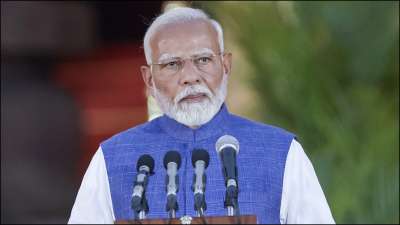Like a cricket team facing tough opponents, Team Modi relies on aggressive posturing and self-confidence to maintain its stanc
 KRC TIMES Desk
KRC TIMES Desk

Deepak Sinha
The performance of the Modi team in its new innings can be best described using a cricketing analogy. The new team is woefully short of bench strength and faces a serious quality issue, with some members lacking commitment and motivation to the cause. Despite this, they have come out, much like the Aussies always do in any competition, riding their luck on abrasive aggression, hype and self-belief.
It is certainly a technique that has worked well for them against most oppositions, forcing them on the back foot from which they seldom recover. But as we have just witnessed in the ongoing T-20 World Championships with their unexpected departure, bluster doesn’t cut much ice with teams that are determined to win and unafraid of battle.
Perhaps Team Modi would do well to keep this in mind.The truth is Team Modi is on a very sticky wicket, not unlike those in the Caribbean, with uneven bounce and unpredictable turns. Not surprisingly, they are already three down with not much to show on the board. Amit Shah opened the innings but was LBW on the second ball he faced, the Kashmiri loosener, followed by the Manipuri yorker that beat him all up.
On a more serious note, while issues of terror attacks in Kashmir can and will be tackled with relative ease, Manipur is at the opposite end of the spectrum. Not since the Punjab and Kashmir insurgencies initially erupted, with terrible consequences, has the Indian State been found so wanting.
The tragedy is that responsibility for this state of affairs rests squarely with Modi 2.0 and its rather incongruous decision not to interfere as things went from bad to worse with the Chief Minister having been rendered hors de combat.
Manipur today has fallen off the cliff and is in need of urgent surgery. If we are to save this patient, and the integrity and health of the North East hinges on that, then the Army has to be pulled out of the cold storage where it sits and allowed to do its job, once again.

The second wicket to have fallen was to a railway googly, that of the relatively experienced and administratively skilled Ashwini Vaishnav. Sadly, for him, he’s got out to a very similar delivery in his last innings as well and just hasn’t been able to discern the googly.
One can feel sorry for him because it is a tough position that he plays, with stress levels that can only be described as gargantuan. That is also the term that one describes our railways as well, and despite whatever the opposition may say, it is in the ICU and needs urgent attention.
Not unlike the Air India story, substantive change is unlikely under the umbrella of one ginormous government-controlled public entity. Before 1950, we had around 55 companies operating railways over 55000kms of track until they were all amalgamated into the Indian Railways.
At present with over double that kilometrage of track to expect one single entity to manage operations, nominally in six divisions, is a herculean task that will lead to repeated systems or human failure with dire consequences. Change is inevitable, the sooner the better if lives matter as all politicians insist, be it complete privatisation or a mix of synchronised public and private enterprise.
The third wicket down, that of Dharmendra Pradhan, to a vicious NEET bouncer, has been the most devastating for him and the team as well.
He’s taken a nasty blow on his helmet that seems to have incapacitated him and has the team teetering on the edge of disaster. Whether he can continue to find a place in the playing eleven or if the team can recover and succeed only time will tell.
Whatever the result in the long term, there is no getting away from the fact that the NEET scandal has been a body blow to Team Modi and its emphasis on loyalty to the cause above all else.
The fact of the matter is that the problem of leaked question papers has been around forever and rumours are doing the rounds of how influential persons have been able to help their children succeed in such centralised exams, such as the CLAT, through means that were perceived to be unfair.
The numbers involved tended to be insignificant, but all that changed with the centralisation of admissions under the NTA, leading to cheating at an industrial scale, for want of a better word.
The damage this has caused to the body politic, especially the upcoming generations, is enormously difficult to fully comprehend. The winners and losers are not divided by ideology, ethnicity, religion or any such measure but by those who have the money and those who don’t, and in this game of snakes and ladders the don’ts have no ladders to climb.
The impact of what all of this means for the ruling coalition, which cannot avoid responsibility, is not difficult to gauge and we may well see some of that fallout in the forthcoming state elections, which can then only further add to Modi’s troubles.
(The columnist, a military veteran and former paratrooper, is presently a Senior Visiting Fellow with the Peninsula Foundation, Chennai; views are personal)


